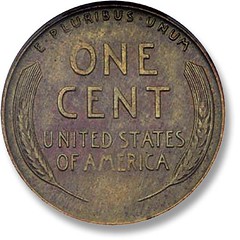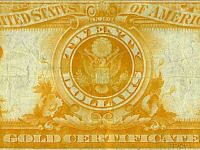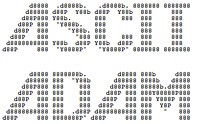penny for my thoughts
Two days ago, I watched a co-worker of mine proceed to drop pennies (copper 1 cent piece) in the trash. I was astonished. He was looking for change to get something from the snack machine, I offered him 3 pennies (not nearly enough for a snack, but that is what I was willing to give). Without blinking he cupped his hand around the pennies and dropped them into the trash. -Such disregard for money. It was like pennies are scrap metal w/o any resale value. Now, I could respect him saying "keep your pennies", but throwing away my gesture of currency... Here are some hard numbers for those who dislike the (highly liquid, metal is worth more than the face value) penny.

Saving 15 cents a day (an arbitrary illustration figure) after 5 years you would have 273 dollars & 75 pennies. -Not a lot, granted, for 5 years worth of conscience effort. After 30 years, 1,642 dollars & 50 pennies. -If you invested the $54.75 per year into an Index Fund with an average ROI of 8%, after 30 years you would have $6,800.51 (w/o taxation or dividends). Averaging 226.68 per year. The more you put sooner, the better the final number. Now let's be honest, that is a decent number... however, we all know that we could get the same returns with less effort (daily putting aside money) and opportunity costs by just simply saving $18.89 a month for 30 years.

What's most important about appreciating pennies is the derivative intangible benefits. It has to do with the fact that money goes to were it is better appreciated. Money has but this one prejudice. You must appreciate money in all of it's forms. Money is attracted to the one who takes care and monitors their money. "He who is responsible with little...." It all starts with a conscience decision today that you will never, ever purpose to throw away money. Unlike marriage, with money you should place emphasis on the details. Pay attention to how many pennies are being wasted every time you don't use a coupon or take an extra trip to the grocery store. Ask yourself if it is worth the waste. Of course, in this society we can never be 100% efficient. There is going to be waste, lots of it. But we should try to maintain it as best as we can.

But that is not all, coins have collector value (if you don't clean it first). In this article, the collector mentions that a circulated (one you might find lying casually in the street) 1813 penny could be anywhere from $200 to $900. It might take you a while to find this specimen, but if you already have money (penny) saving habits clearly established I am convinced that you will eventually find a gem of this sort.
If you have been monitoring my site, I recently put up hard commodities & bond charts. A casual mutual fund (buy and hold for the long term) investor might think that this is a waste of time monitoring these indicators. But I have to disagree. In fact, you have to be either living in a cave or blinded by pride to think that buy and hold is going to comfortably take you into retirement. There needs to be a balance. "Trade less, not more. Every trade is an opportunity to lose." -Larry Williams. You can't just keep blindly buying into a market. Strategize. Have defined rules as to what would take you out of a market, and what would make you enter a market. The exit is always more important that entering a trade.
Keep in mind that bond prices drop before a stock market "correction". Bond prices are associated with the value of the U.S. Dollar, the greedy capitalistic nation it is. When there is less demand in United States Bonds, the bears have essentially made their case for a devalued dollar. This could be because the government was 'printing' too much money (increasing the amount which banks can loan versus the cash in vaults, lowering the interest rate). Too much of this 'cheap money' going around makes the dollar itself worth less. When bonds go up, it is assumed that there is less money being 'floated' (interest rates make money less accessible, banks have more money in their vaults). When our dollar is worth more, US backed securities are very attractive to foreign investors. Foreign investors like to take advantage of the high yield on our interest rates. Banks increase the interest that they are requiring for a loan and thus they can pay more interest.

Gold on the other hand, correlates to fear. Those who (like myself) have a holding of gold (or silver, platinum, & palladium) assume that the dollar will eventually 'break' and that tangibles are going to be in high demand. The fact that our fiscal currency is only backed by what number is written on the piece of paper (by the fed), is discouraging for some people. In the years of 'yore', the first banks were goldsmiths. These goldsmiths where the ones who took deposits and wrote out loans against their holdings. When the foreign investors (namely European and Middle Eastern) start withdrawing large lots of money from our economy, our dollar will become depressed. This could be brought on by many different things. The most popular reasons for those world banks to lose faith in our economy is national debt, namely brought on by war & an aging population (pension plans & government subsidized healthcare).
Bonds down & Gold down = bullish.
Bonds up & Gold up = bearish.
-Larry Williams
Larry also says that you have to be fearful of the market. The more comfortable you are with it, the more likely you are going to lose money. Be ready to cut your loses in an instant if the trend does not go your way.

Saving 15 cents a day (an arbitrary illustration figure) after 5 years you would have 273 dollars & 75 pennies. -Not a lot, granted, for 5 years worth of conscience effort. After 30 years, 1,642 dollars & 50 pennies. -If you invested the $54.75 per year into an Index Fund with an average ROI of 8%, after 30 years you would have $6,800.51 (w/o taxation or dividends). Averaging 226.68 per year. The more you put sooner, the better the final number. Now let's be honest, that is a decent number... however, we all know that we could get the same returns with less effort (daily putting aside money) and opportunity costs by just simply saving $18.89 a month for 30 years.

What's most important about appreciating pennies is the derivative intangible benefits. It has to do with the fact that money goes to were it is better appreciated. Money has but this one prejudice. You must appreciate money in all of it's forms. Money is attracted to the one who takes care and monitors their money. "He who is responsible with little...." It all starts with a conscience decision today that you will never, ever purpose to throw away money. Unlike marriage, with money you should place emphasis on the details. Pay attention to how many pennies are being wasted every time you don't use a coupon or take an extra trip to the grocery store. Ask yourself if it is worth the waste. Of course, in this society we can never be 100% efficient. There is going to be waste, lots of it. But we should try to maintain it as best as we can.

But that is not all, coins have collector value (if you don't clean it first). In this article, the collector mentions that a circulated (one you might find lying casually in the street) 1813 penny could be anywhere from $200 to $900. It might take you a while to find this specimen, but if you already have money (penny) saving habits clearly established I am convinced that you will eventually find a gem of this sort.
If you have been monitoring my site, I recently put up hard commodities & bond charts. A casual mutual fund (buy and hold for the long term) investor might think that this is a waste of time monitoring these indicators. But I have to disagree. In fact, you have to be either living in a cave or blinded by pride to think that buy and hold is going to comfortably take you into retirement. There needs to be a balance. "Trade less, not more. Every trade is an opportunity to lose." -Larry Williams. You can't just keep blindly buying into a market. Strategize. Have defined rules as to what would take you out of a market, and what would make you enter a market. The exit is always more important that entering a trade.
Keep in mind that bond prices drop before a stock market "correction". Bond prices are associated with the value of the U.S. Dollar, the greedy capitalistic nation it is. When there is less demand in United States Bonds, the bears have essentially made their case for a devalued dollar. This could be because the government was 'printing' too much money (increasing the amount which banks can loan versus the cash in vaults, lowering the interest rate). Too much of this 'cheap money' going around makes the dollar itself worth less. When bonds go up, it is assumed that there is less money being 'floated' (interest rates make money less accessible, banks have more money in their vaults). When our dollar is worth more, US backed securities are very attractive to foreign investors. Foreign investors like to take advantage of the high yield on our interest rates. Banks increase the interest that they are requiring for a loan and thus they can pay more interest.

Gold on the other hand, correlates to fear. Those who (like myself) have a holding of gold (or silver, platinum, & palladium) assume that the dollar will eventually 'break' and that tangibles are going to be in high demand. The fact that our fiscal currency is only backed by what number is written on the piece of paper (by the fed), is discouraging for some people. In the years of 'yore', the first banks were goldsmiths. These goldsmiths where the ones who took deposits and wrote out loans against their holdings. When the foreign investors (namely European and Middle Eastern) start withdrawing large lots of money from our economy, our dollar will become depressed. This could be brought on by many different things. The most popular reasons for those world banks to lose faith in our economy is national debt, namely brought on by war & an aging population (pension plans & government subsidized healthcare).
Bonds down & Gold down = bullish.
Bonds up & Gold up = bearish.
-Larry Williams
Larry also says that you have to be fearful of the market. The more comfortable you are with it, the more likely you are going to lose money. Be ready to cut your loses in an instant if the trend does not go your way.
Labels: 1 cent, cent, cents, copper, lincoln, money, pennies, savings
















